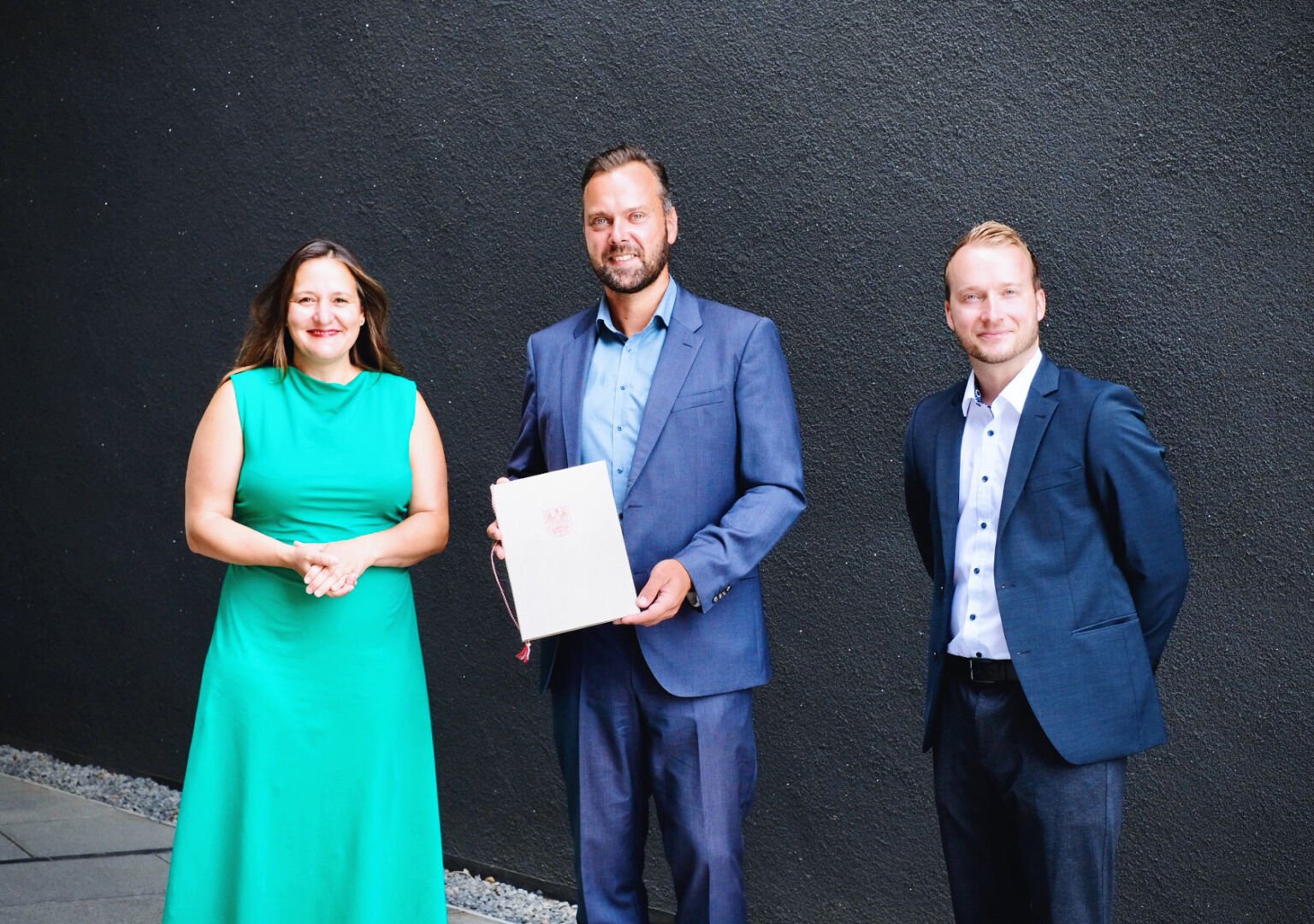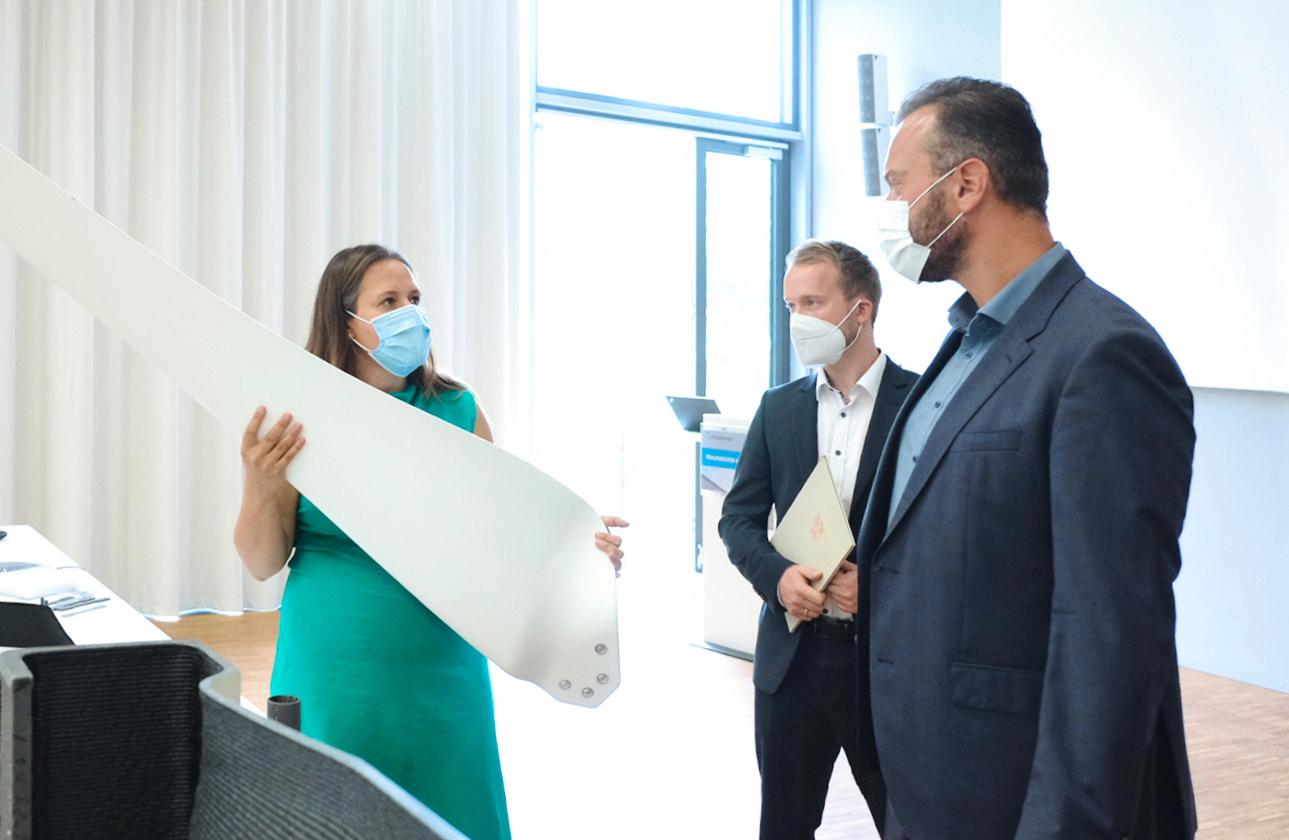
Funding decision — 4.5 million euros for sustainable lightweight construction technologies in Lusatia
Press release of the MWFK | Science Minister Schüle visited the Fraunhofer Institute for Applied Polymer Research IAP in the Potsdam Science Park and handed over a funding notification for the start of the Fraunhofer project group ZenaLeb.
During their visit to the Fraunhofer Institute for Applied Polymer Research IAP at the Potsdam Science Park, Minister of Science Dr. Manja Schüle presented Professor Dr. Holger Seidlitz, head of the research division “Polymer Materials and Composites PYCO”, and Felix Kuke, future head of the Fraunhofer project group “Center for Sustainable Lightweight Technologies” (ZenaLeb), with a grant of 4.5 million euros for the ZenaLeb project group. This is scheduled to start on August 1, 2021 at the BTU Cottbus-Senftenberg.

Minister of Science Dr. Manja Schüle, Prof. Dr.-Ing. Holger Seidlitz and Felix Kuke at the handover of the funding notice. © Fraunhofer IAP, Photo: Till Budde
Minister of Science Dr. Manja Schüle: “Recyclable wind turbines, hydrogen storage as an energy carrier and novel composites are just a few examples of efficient lightweight structures of the next generation. With our funding commitment, 4.5 million euros will flow into their research and development. To this end, the excellently complementary competencies and resources of the BTU Cottbus-Senftenberg and the Fraunhofer IAP will be bundled in the Fraunhofer ZenaLeb project group. This cooperation provides important impetus in Lusatia to successfully shape structural change and to transfer technologies from research directly into application.
Lightweight construction is an essential component for the energy transition and for the necessary achievement of the German government’s climate targets. This makes it clear once again: Brandenburg occupies a top position in sustainability research and the future will be made – once again – in Brandenburg.”
Professor Seidlitz: “ZenaLeb’s vision has been significantly shaped by developments in the context of structural change in order to be able to meet the emerging needs of the regional industry in the field of lightweight construction. As an interface between development and application, ZenaLeb will enable sustainable and practical solutions through our next-generation lightweight construction for the new ICE plant of Deutsche Bahn and the Center for Research on Hybrid-Electric Drives (CHESCO) in Cottbus, as well as automotive manufacturers and their suppliers based in the region. This industry-oriented development and cooperation model forms the basis for a rapid transfer of knowledge and technology and the establishment of the project group as a self-financed unit according to the Fraunhofer model after the end of the start-up funding after 5 years.”

Minister of Science Dr. Manja Schüle, Felix Kuke and Prof. Dr.-Ing. Holger Seidlitz. © Fraunhofer IAP, Photo: Till Budde
The Center for Sustainable Lightweight Technologies (ZenaLeb) will advance the development of efficient next-generation lightweight structures. To this end, holistic, marketable system solutions are to be developed along the entire value chain from polymer development, material preparation and processing to novel manufacturing technologies and forward-looking optimization strategies such as data-driven modeling approaches, artificial intelligence methods and machine learning. These novel hybrid material and manufacturing approaches can be used, for example, in the production of new storage systems for hydrogen.
The Director of Fraunhofer IAP, Prof. Dr. Alexander Böker, adds: “We very much welcome and appreciate the constant support of Fraunhofer IAP by the state of Brandenburg. With the establishment of the new ZenaLeb project group, we are strengthening our commitment to Lusatia and our contribution to regional structural change. ZenaLeb also directly addresses challenges arising from the coal phase-out and opens up new paths to a more sustainable energy industry. Energy transition and sustainability are two of our key topics at Fraunhofer IAP.”
Founded in 1992, the Fraunhofer Institute for Applied Polymer Research IAP specializes in the research and development of polymer applications. It supports companies and partners in the development and optimization of innovative and sustainable materials, process aids and processes. This includes, among other things, the environmentally friendly, economical production and processing of polymers or bio-based polymers from renewable raw materials. The fields of application range from biotechnology, medicine, pharmaceuticals and cosmetics to electronics and optics to applications in packaging, environmental and wastewater technology or the aviation, automotive, paper, construction and coatings industries. Around 250 scientists and staff work at the institute. It has been headed by Prof. Dr. Alexander Böker since 2015.